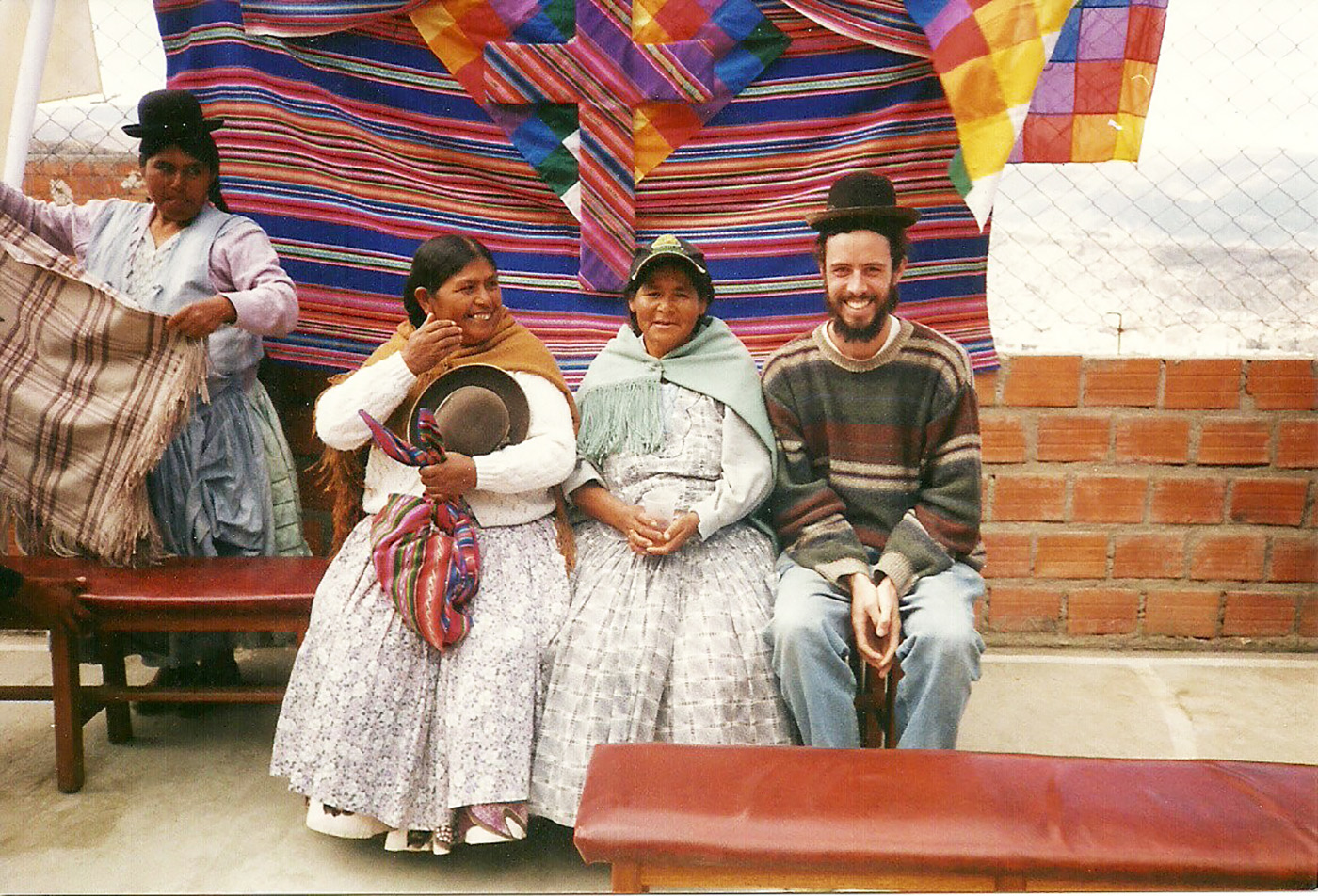
Dan Moriarty, trading hats with Doña Susana in Cochabamba. The baseball cap was a Seattle Supersonics cap Dan had bought on the street in La Paz.
Twenty-four years ago, on Epiphany, I arrived in Bolivia for the first time. I had packed two suitcases and a carry-on for what was initially to be three and a half years as a Maryknoll lay missioner. Only the carry-on—mostly books—arrived with me (the rest came the next day). I had left a freezing cold New York City (and the equally cold Hague in the Netherlands a couple days earlier) with all my winter gear and a pair of bulky work boots on, so as not to have to pack them.
I arrived in mid-summer Cochabamba, via steamy layovers in Miami and Santa Cruz, sweaty and exhausted and nervous and excited and could hardly tell how much the butterflies I was experiencing were from all of that or from the altitude (Cochabamba is at 8,300-plus feet, about half again as high as Denver). I had no change of clothes, no currency, just a guidebook or two and my mostly forgotten high-school Spanish, plus whatever I’d learned in four months of orientation at Maryknoll in New York.
At the old, tiny Cochabamba airport, I watched the one, creaky little conveyor belt for a long time before I accepted that my bags weren’t there. Nobody seemed to have come to meet me, but there was a group of Maryknoll Sisters who had come to pick up Sister Rosemary Kane, who had been in New York for a hip replacement (she was a former Rockette) and was on the same flight by coincidence, so they kept me company.
Sister Fran Kersjes tried to convince me to come work with her at the school for the blind, until another sister told her, “Aw, Franny, let the poor guy breathe, he hasn’t even gotten past the airport doors yet!” Eventually, veteran lay missioner Bernie Butkiewicz came rushing in, apologizing for being late. He helped me fill out the forms so they could find my bags and get them to me, and then we walked out into the bright Andean sun.
I was a little flustered by the baggage thing, and then didn’t know quite what to make of Bernie, who, I would learn later, was a terrific guy, but rather quiet with new folks. I remember he stopped at a place on the side of the road where some trucks were parked, explaining that it was where the fruit vendors came into town from the tropics and sold fruit to the market vendors in the city. He bought some melons at wholesale prices. We stopped by the apartment where I’d be staying, south of the university.
Three of my classmates from orientation had arrived before me and would also be staying there for a few days before we went to our Bolivian host families for language school, but Bernie explained that they were already out in Carol Honerkamp’s barrio for Mass, and that we’d be going there, too, and then staying for lunch with the other lay missioners—Bernie’s wife, Alicia, and (my hero) Cathy Breen. We jumped back in the car, and I tried to take everything in as we drove out to the peripheral neighborhoods west of the city, where Maryknoll had worked for generations.
The mountains were beautiful, but from the high valley they didn’t look like the jagged, snowy peaks I’d expected of the Andes. Instead, they reminded me of the grassy, rolling hills of northern California. The street scenes reminded me a bit of Mexico, where I’d been for 10 days the summer I graduated high school, just six years earlier. But the indigenous people, who were everywhere, dressed differently. Bernie pointed out the broad-brimmed hats, knee-length skirts, summery brocaded blouses, and sandals of the Cochabambinas, and the longer skirts, slipper-style shoes, bowler hats and shawls of the few women we passed who had migrated to Cochabamba from the altiplano. There were street dogs and little kids everywhere.
We finally stopped and got out in front of a small chapel on a dusty street in a humble neighborhood. Mass had begun and was full, so we stood in the back, half-way out the door. Dogs walked in and out. I could see that the new regional superior of the Maryknoll Fathers and Brothers in Bolivia, Father Tom McBride, was saying Mass. I had met him briefly in New York but figured he wouldn’t remember me.
At the kiss of peace, a Quechua gentleman in tire-rubber sandals and a baseball cap offered me the typical Bolivian greeting—a handshake, then a “hug” (really just a pat on both shoulders), followed by another handshake. I was unprepared, it was awkward, and I already felt like a stupid gringo, but also excited because I’d had my first cultural interaction with a Bolivian, and I’d learned something.
I was a little overwhelmed, perhaps just a bit lost and lonely, and definitely disoriented, when it came time to process up for communion. As I slowly shuffled up the line toward the altar, I finally spotted Dave and Kelly Morris and Joe Loney, my friends from orientation. Then I got to the front of the line, and Father Tom held up the host and said with a smile, “The Body of Christ, Dan. Welcome.”
Looking back at the 24 years since and every sacred gift Bolivia has given me, I know he was right.

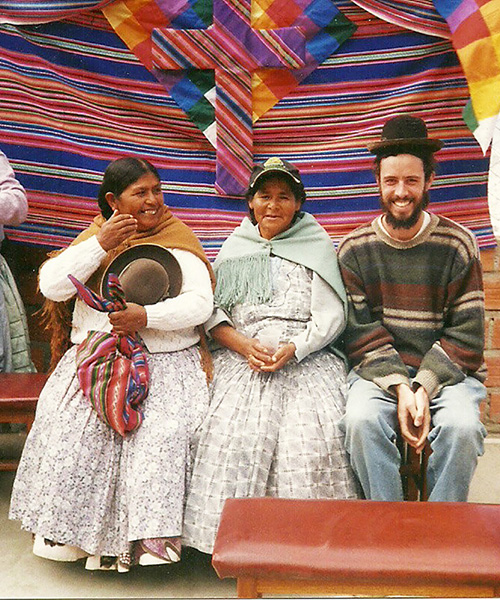

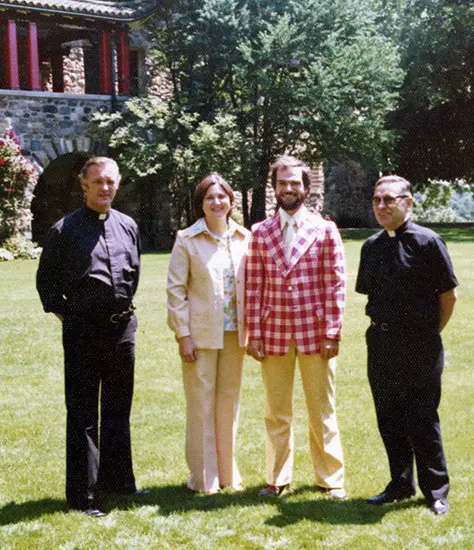
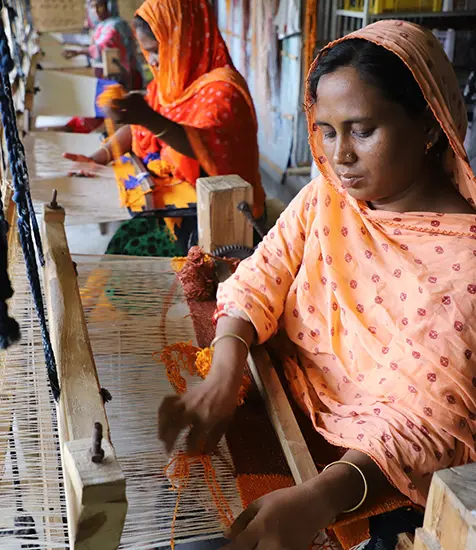
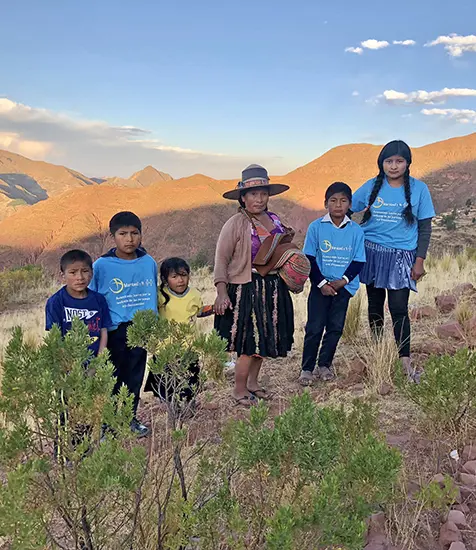




Lots of memories in this one, Dan. Not to “one up”on you but I’ve also been recalling similar “first days” and weeks in La Pax 60 years ago this month. Did we have any idea of what those first steps would lead to in out lives?
Abrazos. You stuck with it, my friend.